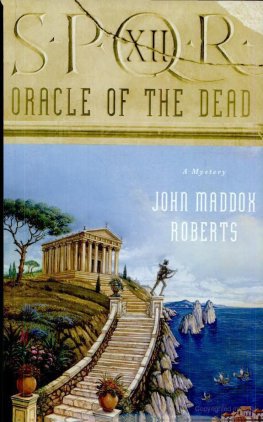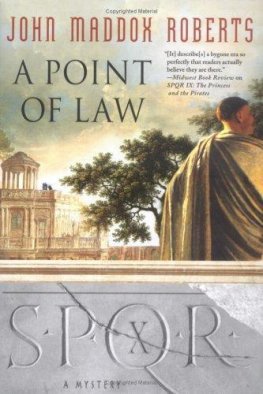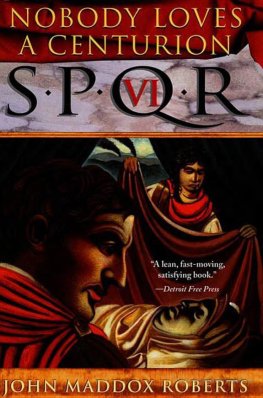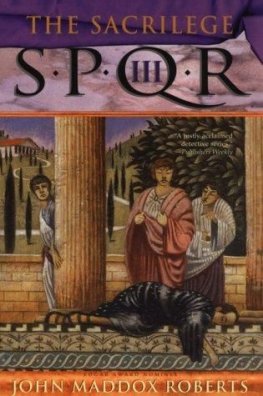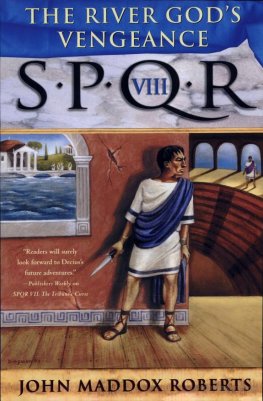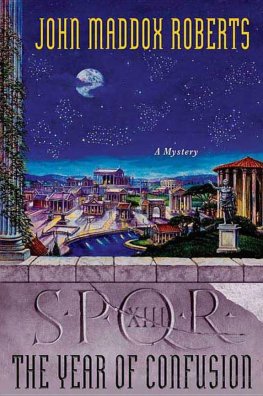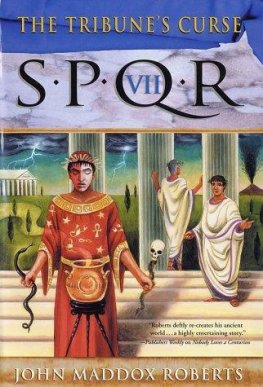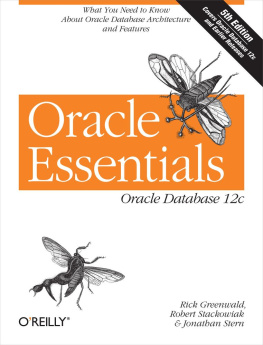John Roberts - Oracle of the Dead
Here you can read online John Roberts - Oracle of the Dead full text of the book (entire story) in english for free. Download pdf and epub, get meaning, cover and reviews about this ebook. year: 0101, publisher: St. Martin, genre: Detective and thriller. Description of the work, (preface) as well as reviews are available. Best literature library LitArk.com created for fans of good reading and offers a wide selection of genres:
Romance novel
Science fiction
Adventure
Detective
Science
History
Home and family
Prose
Art
Politics
Computer
Non-fiction
Religion
Business
Children
Humor
Choose a favorite category and find really read worthwhile books. Enjoy immersion in the world of imagination, feel the emotions of the characters or learn something new for yourself, make an fascinating discovery.
- Book:Oracle of the Dead
- Author:
- Publisher:St. Martin
- Genre:
- Year:0101
- ISBN:9781429939997
- Rating:5 / 5
- Favourites:Add to favourites
- Your mark:
- 100
- 1
- 2
- 3
- 4
- 5
Oracle of the Dead: summary, description and annotation
We offer to read an annotation, description, summary or preface (depends on what the author of the book "Oracle of the Dead" wrote himself). If you haven't found the necessary information about the book — write in the comments, we will try to find it.
Oracle of the Dead — read online for free the complete book (whole text) full work
Below is the text of the book, divided by pages. System saving the place of the last page read, allows you to conveniently read the book "Oracle of the Dead" online for free, without having to search again every time where you left off. Put a bookmark, and you can go to the page where you finished reading at any time.
Font size:
Interval:
Bookmark:
John Maddox Roberts
Oracle of the Dead
1
I first heard of the Oracle of the Dead during the year of my praetorship. I was praetor peregrinus, traveling all over Italy and hearing cases that involved foreigners. It was an extremely agreeable way to spend a year in office and it kept me out of Rome, where things were getting very ugly that year. I spent much of the year in and around Baiae, partly because I had the use of a villa near there and partly because it was a very pleasant place and I could do pretty much as I liked.
Its not far from here, Sextus Plotius told me. He was a director of the bronze founders syndicate, a very prominent local eques and, most importantly, he served the best Chian vintage I ever tasted. Been here forever, maybe from the time of the Aborigines. Its said that Odysseus and Aeneas both consulted the Oracle there.
Baiae is, of course, named for its founder Baios, the steersman of Odysseus. Half the towns I have been in, including Rome, claim to have been founded by a Trojan War veteran or a near descendant of one. This is odd since, if you credit Homer, so many people were killed there that its hard to believe so many town founders could have survived.
How wonderful! Julia gushed. Can we see it? My wife was much more interested in religious matters than I. I had already visited the far more famous Cumaean Sibyl, also nearby, and had not been impressed.
Actually, I said, we have a perfectly good mundus in Rome, my dear.
Its not the same thing at all, she insisted. The mundus just gives us access to the souls of our dead in the underworld. Theres no oracle.
And the dead know the answers to all things, our host added.
I knew that I would end up going to see this marvel. I have never understood why people attribute such omniscience to the dead. Nobody thought most of them were knowledgeable while they were alive and I dont anticipate a postmortem education. Even if they want to contact us, why expect them to tell the truth? Most people are liars while alive, so why shouldnt they continue as such after death? People have such unrealistic expectations.
So, the next morning, I found myself occupying a monstrous litter on its way to the Oracle. Besides myself, my wife, and Plotius, the litter held Julias cousin, also Julia but nicknamed Circe, and Antonia, a sister of Marcus Antonius, the famous one, Caesars loyal supporter, soon to be Master of Horse and, in time, triumvir. Behind us in another litter were a few others of our party: my freedman Hermes, a kinsman named Marcus Caecilius Metellus, and a few others whose names escape me now. Being a praetor and holding imperium, I traveled in considerable state in those days, with a whole gaggle of attendants. Id left my lictors at my villa, since it was a day on which official business was forbidden.
It was an enjoyable trip, because traveling through the Campanian countryside is always enjoyable. Campania holds some of the fairest land in all of Italy. It was once held most unreasonably by a pack of Campanians and Samnites and Greeks and such before we conquered it and settled a lot of good, dependable Roman citizens there to keep the natives in their place. In time we came to a temple on the beautiful bay, with a fine view of the water and the island of Capreae beyond. At the moment we arrived, a fleet of galleys set out from the nearby naval harbor, walking across the water on their oars like aquatic centipedes, adding to the picturesque aspect of the scene, like a fresco come to life.
The ladies made the usual delighted noises as we disembarked from our prodigious transports. Looking around, I gave the temple some attention. It was a strange one, even for southern Campania, where many odd gods are worshipped. It had recently been refurbished to traditional Greek taste, in the Doric style like most Greek temples in Italy. But I could see that it was far older and had been built on a plan I had seen only in certain very ancient ruins, most of them in Marsian territory.
Even odder than the temple were the priests waiting to greet us. Atop the steps were six men in white robes wearing laurel chaplets, clearly devotees of Apollo and quite conventional, but at the bottom were six more robed in black, three men and three women. They wore wreaths of asphodel, a funerary plant, and the priestesses held a number of black dogs on leashes.
Is there one temple here or two? I asked Plotius.
Two, really. The upper temple is dedicated to Apollo, as you can see. The cave of the Oracle of the Dead lies beneath it.
Those look like priests of Hecate, Circe said. The asphodel is sacred to her.
And the black bitch is her tutelary animal, Antonia added. Like many other aristocratic Roman ladies, they knew far too much about foreign cults, especially the less reputable ones. Hecate is Thracian in origin, though she used to be worshipped widely in southern Italy.
How fitting, Julia said. Ulysses and Aeneas both invoked Hecate before entering the underworld. She caught my look. Well, after all, Aeneas was an ancestor of my family. Sometimes I wondered about Julia.
Plotius made the introductions. The chief priest of Apollo was named Eugaeon, and I have forgotten the others. They extended the customary welcome, all the more enthusiastically because I was a Roman praetor. While they did this, they ignored their black-robed colleagues. It was as if these people did not exist. I refrained from asking, willing to go along with whatever local custom prevailed.
Then we got the tour of the temple. As I had thought, the interior revealed far greater antiquity than the exterior with its veneer of white marble and its new, Doric columns. It was murky inside, despite the coating of white paint, which covered what appeared to be older paintings and low-relief carvings. The statue of Apollo was pretty but looked out of place in this gloomy setting. He was in his rarely depicted aspect as Apollo the Far-Shooter, holding a bow with a quiver of arrows by his thigh. This is Apollo in his aspect as avenger. I was certain that one of the old terra-cotta images had once occupied its plinth, or perhaps one of wood. There were rude Italian gods in this place for many centuries before the Greeks came with their graceful deities.
Back outside, we were turned over to the other lot for the real purpose of our visit. They stood where we had first seen them. None of them had as much as touched the lowest temple step. To my surprise, the first to greet us was one of the women.
Does the praetor seek wisdom? she asked, oddly.
Well, I have a fair store of it already, I began. Julia hit me in the ribs with an elbow. I can always use more, of course.
Praetor, Plotius said, this is Iola, chief priestess of the Oracle.
The Oracle is the source of all knowledge, she said in that thrillingly portentous voice employed by religious charlatans everywhere.
Then it has some competition, I observed. The Sibylline Books, the various prophetesses situated here and there- another elbow from Julia.
Frauds, Iola said succinctly.
How so? I asked.
They claim to speak for gods. Our Oracle communicates with the dead. Have you ever known a god personally?
Well, theyve only come to me in dreams, I admitted.
But I will wager you have known a great many dead people.
Um, never thought of it that way, I said, flustered as always when some total loon employs good logic.
She nodded. Just so. Come with me. She turned and led us around to the rear of the temple, with the other sacerdotes and bitches in attendance.
Why is the entrance around the back? I wanted to know.
To face the sunrise, the priestess explained. At sunrise on Midsummer Day, the sun is positioned precisely in the center of the doorway and shines straight down the shaft.
Font size:
Interval:
Bookmark:
Similar books «Oracle of the Dead»
Look at similar books to Oracle of the Dead. We have selected literature similar in name and meaning in the hope of providing readers with more options to find new, interesting, not yet read works.
Discussion, reviews of the book Oracle of the Dead and just readers' own opinions. Leave your comments, write what you think about the work, its meaning or the main characters. Specify what exactly you liked and what you didn't like, and why you think so.

